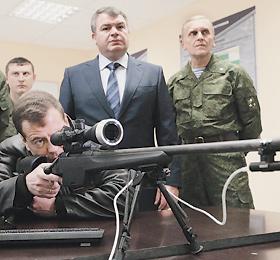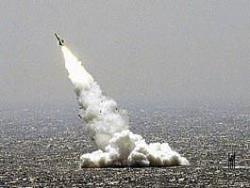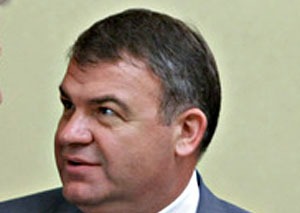Writing in last Friday’s Stoletiye.ru, Rossiyskaya gazeta correspondent Sergey Ptichkin says that, practically on its 60th anniversary, GRU Spetsnaz have landed in a most unexpected place – the Ground Troops. His piece is full of bitter sarcasm.
Ptichkin concludes:
“The GRU Spetsnaz brigades have transferred into the Ground Troops structure. Several units have disbanded altogether. Ranks for duties have been lowered. Now a senior lieutenant will command a reconnaissance group, and that’s the ceiling. All warrant officers have been dismissed – there’s no longer such a rank in the army. And it’s strange that professional sergeants haven’t magically appeared in place of full-grown warrants. The issue of halting parachute training for reconnaissance men is on the agenda. Really, why parachutes if they’ve become ‘pure infantrymen?’ They can deliver them to any rebellious village in the mountains or forests on trains or in KamAZes.”
According to Ptichkin, professional Spetsnaz believe:
“. . . it’s simply impossible to train an eighteen-year-old boy into a genuine reconnaissance man-saboteur in one year. In Afghanistan, Spetsnaz soldiers were sent out only after a year of intensive combat training. That is real service, when a professional military reconnaissance man was born even at the very lowest level, began a year after callup, but now they’re dismissed into the reserves where they forget everything they learned after a few months.”
Ptichkin recalls the GRU Spetsnaz’ anniversary ten years ago. Even though their relations with the Spetsnaz were tense, the Defense Minister and General Staff Chief came and paid their respects.
But this year:
“Neither the Defense Minister, nor the Chief of the General Staff, not even their current chief – the Ground Troops CINC came.”
“Many veterans and even serving officers consider this day a quiet farewell to the GRU Spetsnaz, born 60 years ago. It’s possible something more mobile, combat ready, and effective will take its place.”
So he’s thrown Putin and Medvedev’s own description of the kind of army they want back at them. Of course, the Spetsnaz have always considered themselves the ultimate fighting force.
Ptichkin says the Defense Minister didn’t even issue a traditional order of recognition for the day of Spetsnaz troops.
“There is still the symbol of military reconnaissance – the bat [literally, ‘flying mouse’]. But very soon it’ll be possible to boldly replace this silent night hunter on the emblem with a grey field mouse. A sweet and inoffensive ground-pounder.”
ITAR-TASS’ coverage of the Spetsnaz anniversary also clearly identified them as subordinate to the Ground Troops, CINC General-Colonel Aleksandr Postnikov, and his Chief of Reconnaissance, Deputy Chief of Staff for Reconnaissance, Colonel Vladimir Mardusin.
The press service said Mardusin indicated that:
“. . . at present, army Spetsnaz are organized in independent brigades of special designation, which exist in every military district, and battalions in several combined arms formations of the Southern Military District. Within the formation of the new profile of the armed forces, independent brigades of special designation were transferred to the Ground Troops and are in direct subordination to military district commanders / unified strategic commands.”
Izvestiya’s Dmitriy Litovkin predicted the GRU Spetsnaz’ transfer from the General Staff’s Main Intelligence Directorate (GRU) to the Ground Troops last November on the day of military intelligence (6 November). This was after the 67th, 12th, and 3rd Spetsnaz brigades were disbanded, and even the 16th was in danger of the same.
Igor Korotchenko told Litovkin:
“It’s possible to judge what’s happening in the GRU only through open information. For example, one of the results of the reform is taking the force component from the GRU and resubordinating Spetsnaz to the military district commanders. Only space, radioelectronic, and agent reconnaissance, and also the analytic service remain in today’s ‘Aquarium.’”
Just a reminder, this would mean they were taken even before the six old MDs were reformed into 4 MDs / OSKs. The poor performance of the GRU generally and the Spetsnaz specifically in the 2008 Georgian conflict may have provided impetus for the change. Litovkin and others have reported that the GRU and Spetsnaz received an ‘unsatisfactory’ for their efforts in that brief war. Meanwhile, subordinating Spetsnaz to warfighting MD CINCs on different strategic directions would seem to make sense, the angst of the GRU, its officers, and veterans notwithstanding.
We should, however, get back to the original Ptichkin article. It has a lot of interesting stuff you might want to peruse. Some is hyperbolic though, so take it with a grain of salt . . .
He describes all details of their formation from 24 October 1950. The Spetsnaz were subordinate to the General Staff (GRU) because they were first and foremost strategic, and strategic nuclear, warfighting assets designed to disrupt U.S. and NATO capabilities – nuclear weapons, logistics, transport, communications, etc. – in deep rear areas, including even North America.
And, according to Ptichkin, they were supermen capable of singly accomplishing missions not even combined arms sub-units could handle. And the Spetsnaz were more secret than Soviet nuclear weapons; not even all generals or marshals knew about more than their general outlines.
Everything changed with Afghanistan and glasnost. Every power structure wanted its own special forces. And the GRU Spetsnaz were thrust into the forefront of a war they weren’t created for. But through the skill of their commanders they adapted and were successful. Ptichkin claims a single Spetsnaz detachment could pacify an entire province. And, according to him, if the Spetsnaz had been unleashed fully, the Afghan war would have been won and the country under Soviet control by the mid-1980s.
He says Tajikistan in 1992 proves this isn’t a fantasy. The 15th Spetsnaz brigade under Colonel Vladimir Kvachkov, one of the accused in the Chubays’ assassination attempt, was given a free hand there and pacified the country.
Ptichkin says Spetsnaz weren’t so involved in the First Chechen War, and the results were bad of course. But they were used more extensively in the Second Chechen. And he claims the Chechen Spetsnaz battalion under Sulim Yamadayev prevented Georgian saboteurs from blowing the Roki tunnel in August 2008.
And so, says Ptichkin, for 30 years, Spetsnaz have fought in places they weren’t intended to be, but have fought beautifully anyway. Instead of landing in he main enemy’s rear areas, they are sitting on their own territory prepared, in extreme circumstances, to be sent to the next hot spot in the CIS, and not further afield.
As proof of how they’ve been used, it’s interesting to note the holiday press which says 8 Spetsnaz became Heroes of the Soviet Union in 40 years, but 44 have become Heroes of the Russian Federation in less than 20 years.





